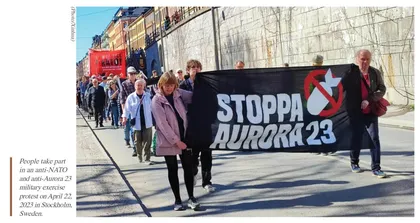The European Political Community: Establishment, Motivation and Prospect
作者: Cui Hongwei

The European Political Community (EPC) is a forum-like institution established by the European countries out of their geopolitical needs and to overcome the dilemma of EU enlargement after the outbreak of Ukraine crisis. It has held three summit meetings so far in Prague on 6 October 2022, Burboac on 1 June 2023 and Granada on 5 October 2023 respectively. As defined by the European Council, it is a coordination platform of great symbolic importance that shall not replace any existing organization, structure or process, nor intends to create new ones at this stage. It aims to make up for the lack of appropriate institutional framework for political coordination in Europe under the Ukraine crisis. At the same time, it shuns away from the rigid institutional approach to deal with security challenges, and offers a new way to take EU out of its enlargement dilemma. Based on effectiveness and sustainability, it cannot avoid the key issues of power resources and leadership during its development, and more importantly, it will forge close relations with the future European security architecture in order to meet the common security challenges of Europe.
Establishment
After the outbreak of the Ukraine crisis on 24 February 2022, the EU accelerated its pace of enlargement, not only restarting the accession negotiations of the Western Balkan countries, but also granting Ukraine, Moldova and Georgia the status of candidate countries for accession. In view of the security challenges posed by the Ukraine crisis, most member states agree on the need for EU enlargement, yet there is wide disagreement on the timetable for enlargement as it involves important fiscal transfers and institutional reforms of the EU.
In his address to the closing ceremony of the Conference on the Future of Europe on 9 May 2022, Macron pointed out that the EU could not in the short term be the only way to structure the European continent, proposed to establish a “new political community” that would allow countries that subscribe to the “core values” to find “a new space for political cooperation” within its framework, so as to maintain the stability of the continent. Macron’s proposal received strong support from European Council President Charles Michel. On 22 June 2022, the proposal for EPC was discussed during the EU Summit. The European Council stated that, the EPC was to be established to provide a platform for across continent political coordination, and to foster political dialogue and cooperation in order to address issues of common interest and promote the security, stability and prosperity of the European continent.
In October 2022, the first summit was held in Prague, bringing together heads of state from 44 countries including the EU and its 27 member states, the UK, Iceland, Norway, Switzerland, Liechtenstein from the European Free Trade Area, the Western Balkans of Serbia, Bosnia and Herzegovina, North Macedonia, Montenegro, Albania and Kosovo, and Eastern Partnership countries of Ukraine, Georgia, Moldova, Azerbaijan, Armenia and Türkiye. Leaders agreed to hold summit meetings twice a year, with the host rotating between EU and non-EU member states. At the Moldova Summit in June 2023, Monaco, San Marino and Andorra were added to its membership.
The EPC sets up an attractive mode for equal cooperation between sovereign states as it adopts flexible and informal intergovernmental exchanges, coordination and cooperation by holding round tables, bilateral and small multilateral meetings, without setting up corresponding permanent institutions and funds. The Ukraine crisis and energy crisis are at the heart of the leaders’ discussions, with other areas covered including digital facility (networks, undersea cables, data centers), infrastructure, gas pipelines, defense, migration, and regional disputes.
France is a staunch supporter of the EPC. In France’s view, the Community could become an integral part of the European political architecture, not only as a useful forum for dialogue, but also as a source of cooperation projects among its members. Close to the French position, Italy is keen to exploit the potential of the Community to promote concrete cooperation projects. Germany, Poland and the European Commission have expressed measured support for cooperation projects. Most EU member states do not want EU institutions to spend too much EU fund due to their participation in the Community, and EU candidate countries fear that the Community could become an alternative to EU enlargement.
Non-EU countries of Moldova, Türkiye and the UK have taken a positive stance towards the EPC. Moldova offered to host the second summit. Türkiye is looking to the Community as a new way to develop relations with European countries while bypassing EU institutions. For the UK, as the Euro-Atlantic region remains a priority in its international strategy and practical cooperation with the EU stays high on its foreign policy agenda, it will host the fourth Summit in the first half of 2024.
While still in its infancy, the EPC member states have already reached some bilateral and small multilateral agreements through the platform. To name a few, the UK and the North Seas Energy Cooperation whose organization membership includes eight EU member states and Norway have signed a MOU to deal with energy supply issues. The French and British leaders pledged to boost bilateral cooperation in energy, illegal immigration and defense. In the area of mediating regional disputes, Michel, Macron and Scholz met with the leaders of Azerbaijan and Armenia in an effort to forge consensus on Nagorno-Karabakh peace agreement. The leaders of Türkiye and Armenia held meetings to normalize bilateral relations. The issue of Kosovo was also high on its agenda.